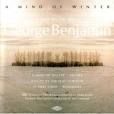Should Composers Conduct Their Own Works?
January 18, 2010
 Just as it's often the case that playwrights and screenwriters aren't always the best people to direct their own plays and movies, so composers don't necessarily do an optimal job leading performances of their works from the podium.
Just as it's often the case that playwrights and screenwriters aren't always the best people to direct their own plays and movies, so composers don't necessarily do an optimal job leading performances of their works from the podium.
This hypothesis was borne out over the weekend when I saw the British composer George Benjamin conducting the San Francisco Symphony in two of his pieces -- "Duet", a work for piano and orchestra written in 2008, and "Ringed by the Flat Horizon", which the composer wrote at the very start of his career in 1980.
Unlike the previous concert of Benjamin's work which I saw last week under the baton of David Robertson, this composer-helmed concert lacked, for want of a better word, oomph. Benjamin conducted both of his pieces as if sewing a pair of delicate lace curtains. The soundscape shimmered and was extremely intricate. But it all sounded very much the same. Robertson, on the other hand, brought out the extreme contrasts in the composer's works. We heard filigree and fire in Benjamin's music as interpreted by Robertson. But the contrasts were subdued in the composer's hands. Perhaps it's a case of the creator "not being able to see the wood for the trees"?
PS: Read Stephen Smoliar's response to my blog post here.



3 Comments:
Let me propose an alternative hypothesis, which is that this is a case of the listener being biased by the order of his/her listening experiences. When I wrote my
preview piece for Examiner.com, I was eating my own dog food in recommending the
Nimbus recording that includes Ringed by the Flat Horizon performed
by the BBC Symphony Orchestra conducted by Mark Elder. I found that Elder was very subtle in differentiating contrasting features; and I think that heightened my sensitivity to "
what the thunder said."
Come to think of it, didn't you have your own earlier experience with "Jubilation?" I seem to recall your having written that "the piece came across without as much force as it should have." Force as in "oomph," right? (Don't you hate it when everything we write goes "on the record?")
Robertson may have brought more of that oomph to
Dance Figures; but I suspect most of it came from the strength of the memory of the "Hammers" section.
For better or worse we have no control of the order in which we encounter our musical experiences. As Marx said, we make our own history. He also said that it rarely turns out as we think it will!
By Stephen Smoliar, At
January 18, 2010 at 3:43 PM
Stephen Smoliar, At
January 18, 2010 at 3:43 PM
thanks for these insights, stephen. you make a very astute point. and yes, jubilation didn't come across with the same kind of force I'd imagined it should have in the intervening decades since I'd performed in the work. but robertson still managed to bring out the details in the musical tapestry with more color in general. i'm not sure if the order in which i'd heard the concerts would have changed how i essentially felt about them though...
By Chloe Veltman, At
January 18, 2010 at 3:48 PM
Chloe Veltman, At
January 18, 2010 at 3:48 PM
great read. I would love to follow you on twitter. By the way, did anyone hear that some chinese hacker had busted twitter yesterday again.
By Anonymous, At
January 18, 2010 at 5:54 PM
Anonymous, At
January 18, 2010 at 5:54 PM
Post a Comment
<< Home